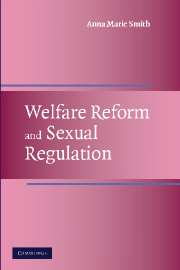Book contents
- Frontmatter
- Contents
- Acknowledgments
- Introduction
- 1 From Paternafare to Marriage Promotion: Sexual Regulation and Welfare Reform
- 2 Biopower and Sexual Regulation
- 3 Post-Foucauldian Sexual Regulation Theory
- 4 The Ideological Construction of Paternafare
- 5 Paternafare Law Today
- 6 Welfare Reform, Reproductive Heterosexuality, and Marriage
- 7 The Normative Assessment of Paternafare: An Ideal-Type Analysis
- 8 Feminist Visions
- Appendix I Gender, Race, and the TANF Population
- Appendix II Family Structure and Poverty
- Appendix III Child Support Enforcement Allocations in a Neoliberal Fiscal Environment
- Appendix IV The “Swarming” of Paternafare
- Appendix V The Disconnection between Poverty and TANF Assistance
- Appendix VI Race, Ethnicity, and the Family Cap
- Index
Introduction
Published online by Cambridge University Press: 05 June 2012
- Frontmatter
- Contents
- Acknowledgments
- Introduction
- 1 From Paternafare to Marriage Promotion: Sexual Regulation and Welfare Reform
- 2 Biopower and Sexual Regulation
- 3 Post-Foucauldian Sexual Regulation Theory
- 4 The Ideological Construction of Paternafare
- 5 Paternafare Law Today
- 6 Welfare Reform, Reproductive Heterosexuality, and Marriage
- 7 The Normative Assessment of Paternafare: An Ideal-Type Analysis
- 8 Feminist Visions
- Appendix I Gender, Race, and the TANF Population
- Appendix II Family Structure and Poverty
- Appendix III Child Support Enforcement Allocations in a Neoliberal Fiscal Environment
- Appendix IV The “Swarming” of Paternafare
- Appendix V The Disconnection between Poverty and TANF Assistance
- Appendix VI Race, Ethnicity, and the Family Cap
- Index
Summary
At first glance, the diagnosis of the mode of governance expressed in welfare reform seems to be a rather straightforward matter. According to the typical journalistic narrative, the State has effectively divided the recipient population into two groups: the “most employable” and the “most encumbered.” The “most employable” have been “diverted” or “cut off” from poverty assistance thanks to the impact of welfare reform's stricter eligibility rules, the workfare requirement, sanctions, and time limits. The type of State-citizen contact that is at work in this account is purely negative and noninterventionary: the recipient has been “expelled” from a program such that she has been forced to become self-reliant by entering the wage labor market. The normative character of her “expulsion” is, of course, hotly debated; neoliberal welfare reformers congratulate themselves on the fact that the most employable are no longer coddled by an excessively generous State, whereas progressives condemn the policies that are forcing poor single mothers to fend for themselves in the brutal conditions of the antifamily postindustrial labor market.
If we look closer at the actual structure of welfare reform law, however, a different image of power relations comes into view. To be sure, many poor families have been driven from the Temporary Assistance for Needy Families (TANF) program; the fact that the rolls have been drastically trimmed and remained quite low even during the recession of the early 2000s is beyond dispute. However, the program's eligibility rules, requirements, and sanctions are complex in nature.
- Type
- Chapter
- Information
- Welfare Reform and Sexual Regulation , pp. 1 - 7Publisher: Cambridge University PressPrint publication year: 2007



